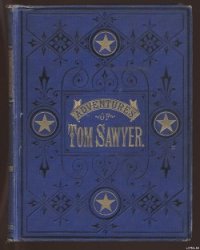A Connecticut Yankee in King Arthur's Court - Twain Mark (книга бесплатный формат txt) 📗
Hang him, he said it was the twenty-first! It made me turn cold to hear him. I begged him not to make any mistake about it; but he was sure; he knew it was the 21st. So, that feather-headed boy had botched things again! The time of the day was right for the eclipse; I had seen that for myself, in the beginning, by the dial that was near by. Yes, I was in King Arthur's court, and I might as well make the most out of it I could.
The darkness was steadily growing, the people becoming more and more distressed. I now said:
"I have reflected, Sir King. For a lesson, I will let this darkness proceed, and spread night in the world; but whether I blot out the sun for good, or restore it, shall rest with you. These are the terms, to wit: You shall remain king over all your dominions, and receive all the glories and honors that belong to the kingship; but you shall appoint me your perpetual minister and executive, and give me for my services one per cent of such actual increase of revenue over and above its present amount as I may succeed in creating for the state. If I can't live on that, I sha'n't ask anybody to give me a lift. Is it satisfactory?"
There was a prodigious roar of applause, and out of the midst of it the king's voice rose, saying:
"Away with his bonds, and set him free! and do him homage, high and low, rich and poor, for he is become the king's right hand, is clothed with power and authority, and his seat is upon the highest step of the throne! Now sweep away this creeping night, and bring the light and cheer again, that all the world may bless thee."
But I said:
"That a common man should be shamed before the world, is nothing; but it were dishonor to the king if any that saw his minister naked should not also see him delivered from his shame. If I might ask that my clothes be brought again-"
"They are not meet," the king broke in. "Fetch raiment of another sort; clothe him like a prince!"
My idea worked. I wanted to keep things as they were till the eclipse was total, otherwise they would be trying again to get me to dismiss the darkness, and of course I couldn't do it. Sending for the clothes gained some delay, but not enough. So I had to make another excuse. I said it would be but natural if the king should change his mind and repent to some extent of what he had done under excitement; therefore I would let the darkness grow a while, and if at the end of a reasonable time the king had kept his mind the same, the darkness should be dismissed. Neither the king nor anybody else was satisfied with that arrangement, but I had to stick to my point.
It grew darker and darker and blacker and blacker, while I struggled with those awkward sixth-century clothes. It got to be pitch dark, at last, and the multitude groaned with horror to feel the cold uncanny night breezes fan through the place and see the stars come out and twinkle in the sky. At last the eclipse was total, and I was very glad of it, but everybody else was in misery; which was quite natural. I said:
"The king, by his silence, still stands to the terms." Then I lifted up my hands-stood just so a moment-then I said, with the most awful solemnity: "Let the enchantment dissolve and pass harmless away!"
There was no response, for a moment, in that deep darkness and that graveyard hush. But when the silver rim of the sun pushed itself out, a moment or two later, the assemblage broke loose with a vast shout and came pouring down like a deluge to smother me with blessings and gratitude; and Clarence was not the last of the wash, to be sure.
CHAPTER VII
MERLIN'S TOWER
Inasmuch as I was now the second personage in the Kingdom, as far as political power and authority were concerned, much was made of me. My raiment was of silks and velvets and cloth of gold, and by consequence was very showy, also uncomfortable. But habit would soon reconcile me to my clothes; I was aware of that. I was given the choicest suite of apartments in the castle, after the king's. They were aglow with loud-colored silken hangings, but the stone floors had nothing but rushes on them for a carpet, and they were misfit rushes at that, being not all of one breed. As for conveniences, properly speaking, there weren't any. I mean little conveniences; it is the little conveniences that make the real comfort of life. The big oaken chairs, graced with rude carvings, were well enough, but that was the stopping place. There was no soap, no matches, no looking-glass-except a metal one, about as powerful as a pail of water. And not a chromo. I had been used to chromos for years, and I saw now that without my suspecting it a passion for art had got worked into the fabric of my being, and was become a part of me. It made me homesick to look around over this proud and gaudy but heartless barrenness and remember that in our house in East Hartford, all unpretending as it was, you couldn't go into a room but you would find an insurance-chromo, or at least a three-color God-Bless-Our-Home over the door; and in the parlor we had nine. But here, even in my grand room of state, there wasn't anything in the nature of a picture except a thing the size of a bedquilt, which was either woven or knitted (it had darned places in it), and nothing in it was the right color or the right shape; and as for proportions, even Raphael himself couldn't have botched them more formidably, after all his practice on those nightmares they call his "celebrated Hampton Court cartoons." Raphael was a bird. We had several of his chromos; one was his "Miraculous Draught of Fishes," where he puts in a miracle of his own-puts three men into a canoe which wouldn't have held a dog without upsetting. I always admired to study R.'s art, it was so fresh and unconventional.
There wasn't even a bell or a speaking-tube in the castle. I had a great many servants, and those that were on duty lolled in the anteroom; and when I wanted one of them I had to go and call for him. There was no gas, there were no candles; a bronze dish half full of boarding-house butter with a blazing rag floating in it was the thing that produced what was regarded as light. A lot of these hung along the walls and modified the dark, just toned it down enough to make it dismal. If you went out at night, your servants carried torches. There were no books, pens, paper or ink, and no glass in the openings they believed to be windows. It is a little thing-glass is-until it is absent, then it becomes a big thing. But perhaps the worst of all was, that there wasn't any sugar, coffee, tea, or tobacco. I saw that I was just another Robinson Crusoe cast away on an uninhabited island, with no society but some more or less tame animals, and if I wanted to make life bearable I must do as he did-invent, contrive, create, reorganize things; set brain and hand to work, and keep them busy. Well, that was in my line.
One thing troubled me along at first-the immense interest which people took in me. Apparently the whole nation wanted a look at me. It soon transpired that the eclipse had scared the British world almost to death; that while it lasted the whole country, from one end to the other, was in a pitiable state of panic, and the churches, hermitages, and monkeries overflowed with praying and weeping poor creatures who thought the end of the world was come. Then had followed the news that the producer of this awful event was a stranger, a mighty magician at Arthur's court; that he could have blown out the sun like a candle, and was just going to do it when his mercy was purchased, and he then dissolved his enchantments, and was now recognized and honored as the man who had by his unaided might saved the globe from destruction and its peoples from extinction. Now if you consider that everybody believed that, and not only believed it, but never even dreamed of doubting it, you will easily understand that there was not a person in all Britain that would not have walked fifty miles to get a sight of me. Of course I was all the talk-all other subjects were dropped; even the king became suddenly a person of minor interest and notoriety. Within twenty-four hours the delegations began to arrive, and from that time onward for a fortnight they kept coming. The village was crowded, and all the countryside. I had to go out a dozen times a day and show myself to these reverent and awe-stricken multitudes. It came to be a great burden, as to time and trouble, but of course it was at the same time compensatingly agreeable to be so celebrated and such a center of homage. It turned Brer Merlin green with envy and spite, which was a great satisfaction to me. But there was one thing I couldn't understand-nobody had asked for an autograph. I spoke to Clarence about it. By George! I had to explain to him what it was. Then he said nobody in the country could read or write but a few dozen priests. Land! think of that.



